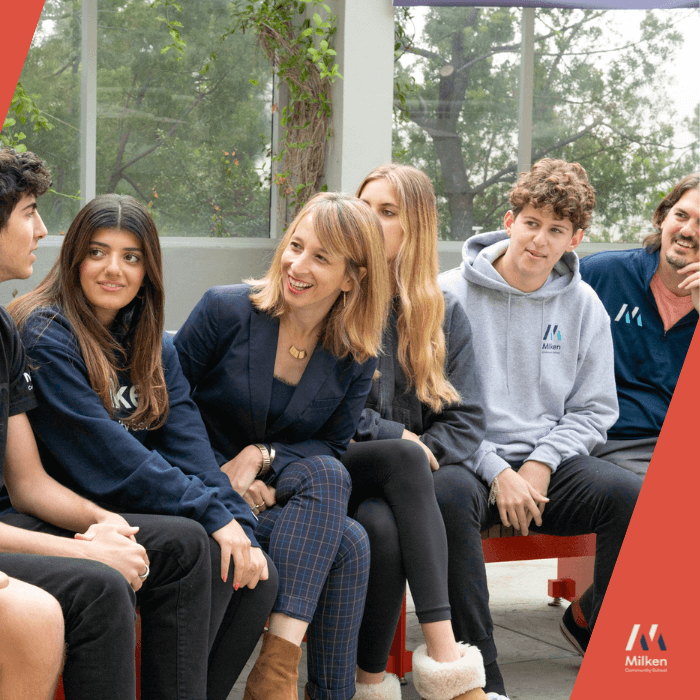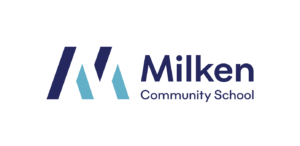“Because the world our children will create tomorrow is born in the School we build today”
Our School, founded on Jewish values, is about who our children can become and how they can help others become who they might be.

Adapted from a speech Dr. Shulkind gave to prospective Milken parents
As a graduate student, I heard Sara Lawrence Lightfoot, professor at Harvard’s school of education, speak about schools as mirrors. She said, “schools have always been the arena where the cultural and historical dramas of our society get played out. Schools, she said, mirror social priorities, values and conflicts, but also the ways in which, in vivid microcosm–they magnify and intensify them.”
A few weeks ago, a banner on a bridge overhanging the 405 freeway said, “Kanye is right about the Jews,” accompanied by people holding up Nazi salutes as cars drove below them. As context, over the course of the last two weeks, YE (Kanye West) has made several very public antisemitic statements.
Before the decision from Adidas to break with YE was announced, our senior leadership team gathered to discuss the dilemma of the impending Homecoming football game and the Adidas branded football uniforms our students wear. As educators, we felt they could not wear these uniforms, but we were sure that the kids would not be on the same page–they loved YE–he is a teenage icon. We were sure that our plea that they represented more than themselves, and that the symbolism of a Jewish football team in front of a crowd of a thousand would not resonate with their adolescent sensibilities.
We planned what we anticipated would be a very difficult meeting with the team meeting at lunch. The next morning, though, Adidas denounced YE and, relieved and grateful, we told the students the meeting was not necessary, though we would be there in case they wanted to talk. We were sure no one would show up. The entire team did.
The primary takeaway of that meeting after a lot of thoughtful discussion, was that the team wants to focus on Jewish pride, realizing they have an important role in representing our culture. The team chose to wear white colored uniforms to stand in solidarity with all Milken students (who would also be in their Homecoming white t-shirts) against hate. They ran onto the field carrying the Israeli and American flags, and our singing of Hatikvah was imbued with especially relevant meaning. It was an example of our mission in action so compelling, there were many watery eyes in the crowd.
Our mission reads:
Our School, founded on Jewish values, is about who our children can become and how they can help others become who they might be. Because the world our children will create tomorrow is born in the School we build today, our mission is to educate our children so they can surpass us.
Earlier in the same week, I stumbled upon a class of 11th graders, sitting in a circle in our outdoor garden, wrestling with a famous and complex Talmudic text — a wild, dramatic story of debate (machloket) between groups of scholars about who has authority to determine Jewish law. The text ends with a key line from our mission statement “נצחוני בני” our children have surpassed us. When I stopped by their class, I heard one student wonder about the role of humans in evolving and adapting the Torah’s laws. Another student wondered what happened as time goes on and people add their voices each generation, sometimes even disagreeing with the divine word. But another student suggested that this was evidence of success, actually, that we interpret the Torah on our own terms and for our own generations.
This scene–this conversation about the text– I thought, has happened thousands of times over millennia and around the globe. This scene, I thought, has never happened exactly like this, and it is our students’ unique ideas and the ways their ideas bump into each other and build on each other that will shape the future.
As I reflected on both of these stories, I realized something–we, the adults, parents and educators are the bridge between the here and now and the future. Many of you reading this are making important decisions about the kind of future you want your children to inhabit and then create for their own children.
Sara Lawrence Lightfoot’s ideas about schools as a mirror for society were codified in her book The Essential Conversation. She expounds on this idea in a chapter called “mirrors and metaphors.” To me, and to Milken, the football team’s decision and the 11th graders’ conversation is important because it was a reflection of society overall AND because the educators were a bridge, guiding the students to look at situations and their academic studies not only for the here and now, but for the better world they could create. Both of these moments contained within them the future and the past bound up together. It is our job–yours and mine–to be the bridge, to raise them in part because of those who came before us, of those generational echoes that stake claim on who we hope our children will become and how they will help others become who they might be.
Milken Community School is a private day school in Los Angeles committed to incorporating Jewish values in a rigorous, college preparatory education. Milken is a national leader in high-impact learning that puts grade 6–12 students on a path to personal and professional achievement. Our mission is to educate our children so they can surpass us, equipping them with critical tools for fulfillment and success.













